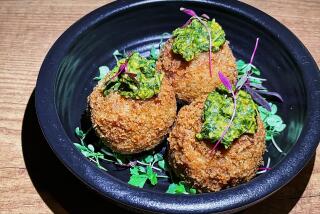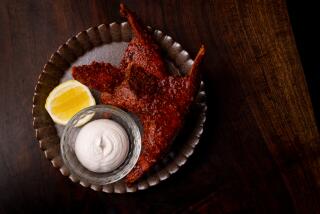Veggies Bathe With the Fishes
- Share via
Aromatherapy is the thing these days, but the hot baths at Drago restaurant Saturday afternoon would have puzzled even the most ardent disciple.
If linden blossoms calm and lavender induces sleep, what could be the possible effect of a long soak in garlic and anchovies? Never mind, bagna cauda (which means “hot bath” in the Piedmontese dialect of Italian) is for dipping vegetables, not people.
And Saturday’s lunch, put together by Italian culinary expert Faith Willinger, showcased a line of prepared bagna cauda and bagna cauda dishes made by Roberto and Margherita Santopietro of Il Mongetto, an upscale mom-and-pop firm in Vignale Monferrato, northeast of Asti in Piedmont.
Why you would want to buy a prepared bagna cauda is something of a mystery--it’s a simple but heady paste of anchovies, garlic and olive oil cooked at an extremely low temperature. But the Santopietro’s bottled brand is very good for the convenience-minded, made with salt-cured anchovies and good Ligurian oil.
They also sell a full line of bagna cauda paraphernalia, including quite beautiful little earthenware dishes that are essentially bowls set over votive candles (for keeping the bagna, er, cauda), delicious pickled cherry peppers stuffed with anchovies and capers and mostarda d’uva or cugna, a kind of smooth chutney made from grape must and winter fruits, especially quince.
A bagna cauda meal starts with vegetables, both raw and cooked (Saturday’s spread included red and yellow bell peppers, fennel, cooked white and purple potatoes and raw baby carrots), which are dipped in the garlic-anchovy paste. When the vegetables are gone, eggs are scrambled in the remains of the bagna cauda and, for the luxe, white truffles are shaved over the top. Unfortunately for Saturday’s diners, Roberto Santopietro forgot the truffle allotment in a refrigerator in New York. And when it came time for dinner, we couldn’t help noticing that both the Santopietros passed on the paste, instead dipping their vegetables in salted olive oil (pinzimonio).
“We have to live with this stuff every day,” explained Margherita, by way of Willinger. “You can’t imagine. Our house smells of it, our closets smell of it, our clothes smell of it.”
More to Read
Eat your way across L.A.
Get our weekly Tasting Notes newsletter for reviews, news and more.
You may occasionally receive promotional content from the Los Angeles Times.











